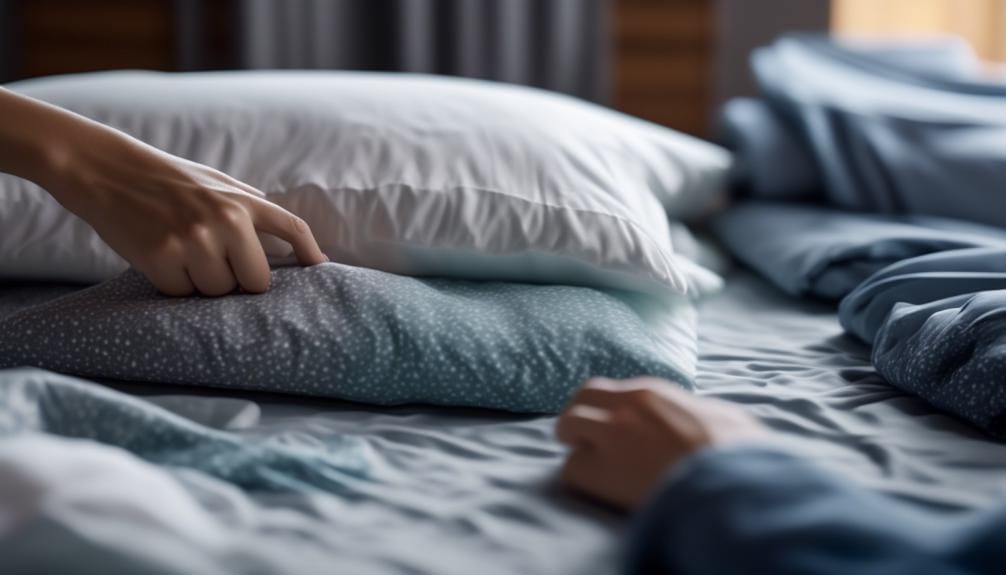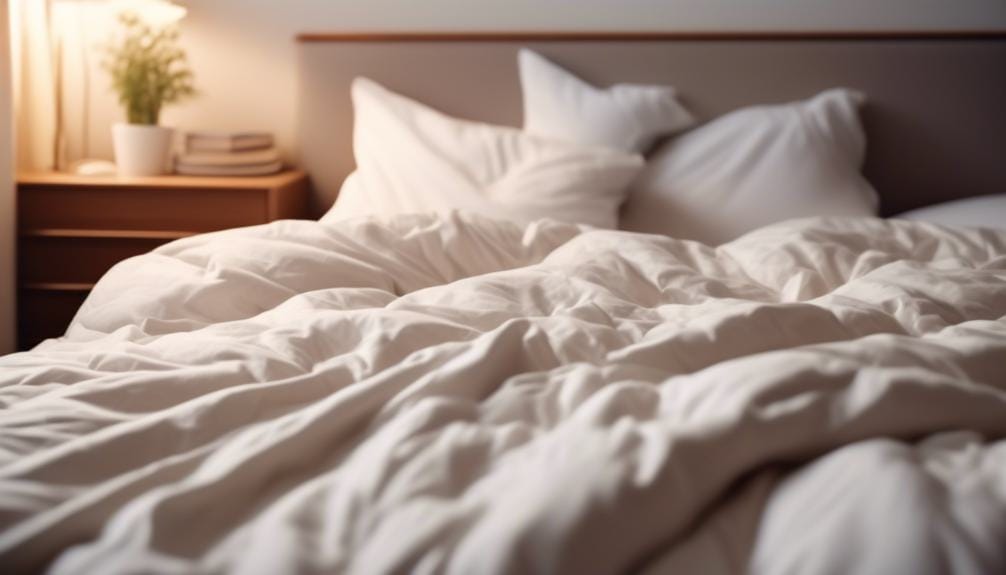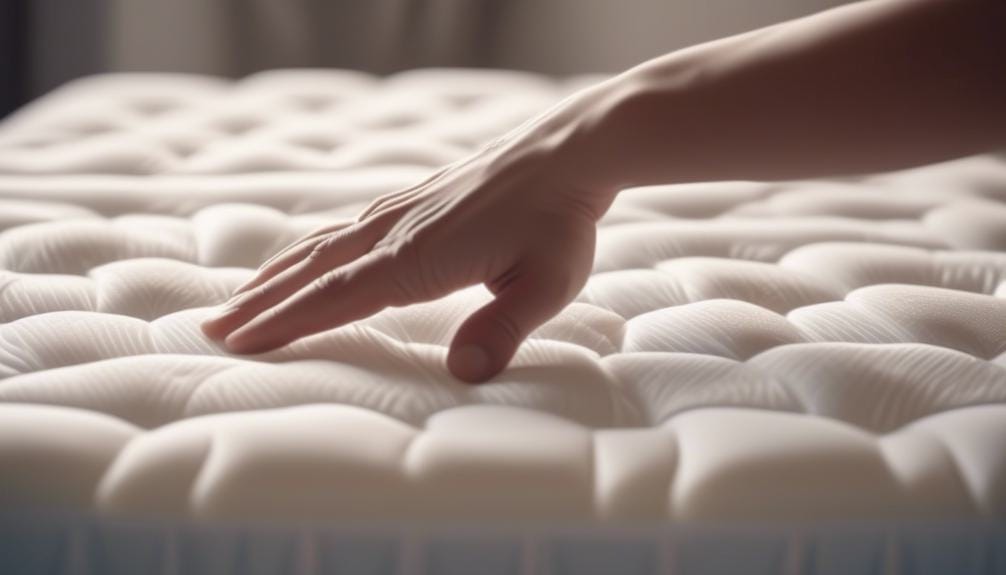How to Make Duvet Less Noisy: Silencing Your Bedding
Tired of your duvet sounding like a bag of potato chips every time you move in bed? You’re not alone. Many people find themselves wishing for a quieter night’s sleep. But fear not, there are practical solutions to help silence your bedding.
Imagine snuggling into bed and experiencing the soothing silence of a calm night’s rest. You can achieve this by making a few simple changes to your bedding.
So, how can you transform your noisy duvet into a peaceful oasis of quiet? Let’s explore some effective strategies to help you achieve a more peaceful and restful sleep.
Key Takeaways
- Choose a down-free comforter with a soft, cozy covering made of noise-reducing fabrics
- Select a duvet cover with a zipper closure and a sateen finish for a smoother and quieter texture
- Clean and maintain the duvet regularly to prevent dust, debris, and moisture buildup
- Consider using a noise-reducing quilt or blanket between the comforter and duvet cover
Choosing the Right Duvet Filling

When selecting a duvet filling, you’ll want to consider various factors that can impact the noise level, such as the material and construction of the filling.
Choosing the right duvet filling is crucial in ensuring a peaceful night’s sleep. Opt for down-free comforters, like the ones offered by The Co. Store, as they’re known to reduce noise significantly.
Additionally, consider the material of the duvet filling; some materials are inherently quieter than others. Seek input and recommendations from other users who’ve experience with quieter duvet fillings.
Look for comforters with softer, cozy coverings, as these tend to produce less noise. Synthetic fabrics like microgel are also worth considering, as they tend to make less noise when newly purchased.
Taking these factors into account will help you find a duvet filling that makes minimal noise and allows for a restful night’s sleep.
Selecting Noise-Reducing Fabrics

Considering the impact of duvet filling on noise level, your next step is to focus on selecting noise-reducing fabrics to ensure a peaceful night’s sleep. When choosing bedding, look for fabrics known for their noise-reducing properties. Fabrics like brushed microfiber, cotton sateen, cambric cotton, and batiste weave are excellent options to minimize noise. Additionally, selecting bedding with a lower thread count can also help reduce crinkling sounds. For a quieter sleep environment, opt for a down-free comforter from The Co. Store, as it can be less noisy than traditional down comforters. Lastly, consider bedding with a down-proof treatment, particularly when it’s new, to further reduce the crinkling sound.
| Noise-Reducing Fabrics | Noise Reduction Properties |
|---|---|
| Brushed Microfiber | Minimizes crinkling sounds |
| Cotton Sateen | Reduces noise and rustling |
| Cambric Cotton | Known for down-proof properties, helps minimize noise |
| Batiste Weave | Down-proof fabric, reduces crinkling noises |
Utilizing Duvet Covers Effectively

To effectively utilize duvet covers for minimizing noise, select a soft and cozy material such as cotton or microfiber to ensure a peaceful and restful sleep environment. Consider a higher thread count for a smoother and quieter duvet cover fabric. Opt for duvet covers with a sateen finish for a softer, less noisy texture.
Choose a duvet cover with a zipper closure instead of buttons to reduce rustling and noise. Additionally, you can make your bed even quieter by layering a thin, noise-reducing quilt or blanket between the comforter and duvet cover.
Regular Cleaning and Maintenance

Now that you’ve mastered the art of utilizing duvet covers for a peaceful sleep environment, it’s time to focus on the crucial aspect of regular cleaning and maintenance to ensure your comforter stays in top condition.
To keep your duvet less noisy, vacuum it regularly to remove dust and debris. When washing, use a gentle detergent and follow the care instructions provided by the manufacturer to maintain its quality. It’s essential to ensure the comforter is completely dry before using it to prevent moisture buildup, which can lead to unwanted noise.
Additionally, fluff and air out the comforter regularly to maintain its loft and reduce noise. Proper storage when not in use is also vital to prevent moisture accumulation and maintain its quality.
Additional Tips for Noise Reduction

For an effective reduction of noise from your duvet, consider using a duvet cover made of soft, brushed microfiber to help muffle any potential sounds from the comforter. Opt for a larger-sized duvet cover to provide extra space for the comforter, reducing friction and noise.
Additionally, place a thin, breathable quilted mattress pad or topper under the duvet to minimize any rustling sounds. Regularly fluff and shake the comforter to redistribute the filling, which can help reduce any crinkling or clumping noises.
Moreover, keeping the bedroom well-ventilated is crucial to prevent moisture buildup in the comforter, as this can lead to potential noise issues.
Frequently Asked Questions
Why Is My Duvet so Noisy?
Your duvet may be noisy due to stiff high-quality cotton, tight weave, protective coating, or synthetic fabrics. Trapped moisture in older ones can also cause clumping and sounds. Consider these factors when addressing the noise issue.
How Do I Make My Duvet Less Crinkly?
To make your duvet less crinkly, try using a down-free comforter from a reputable brand, like The Co. Store. Seek input from others with similar experiences and consider the material and tightness of the weave.
Why Are Duvets Crinkly?
Duvets are crinkly due to the stiff high-quality cotton material and tight weave used to sew them. Protective coatings, synthetic fabrics, and trapped moisture can also contribute to the noise. Consider these factors when addressing the issue.
Why Do Duvets Rustle?
To make duvet less noisy, try using a duvet cover made of a softer, more flexible material. Choose a cover with a lower thread count to reduce rustling. This simple switch can help dampen the noise and give you a quieter night’s sleep.
Conclusion
So, there you have it! By choosing the right duvet filling, selecting noise-reducing fabrics, using duvet covers effectively, and maintaining your bedding regularly, you can easily make your duvet less noisy.
With these simple tips, you can enjoy a quiet and peaceful night’s sleep without the crinkling sound of your bedding disturbing you. Sweet dreams!
